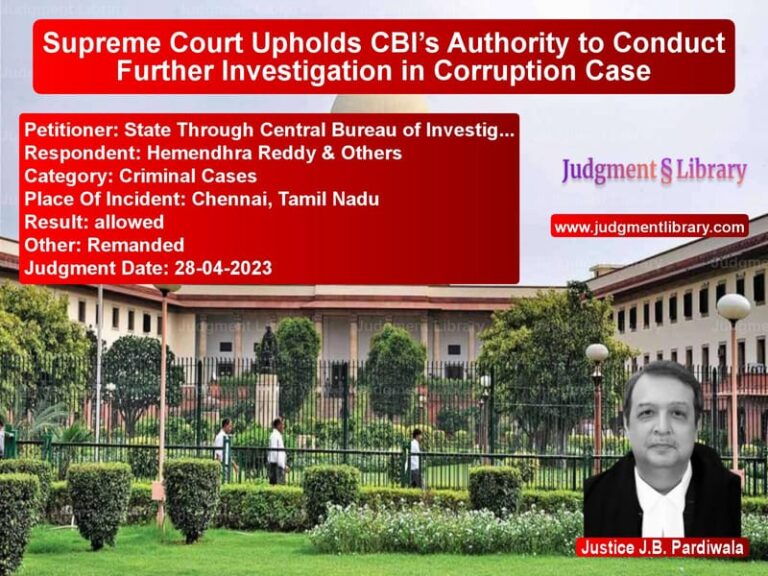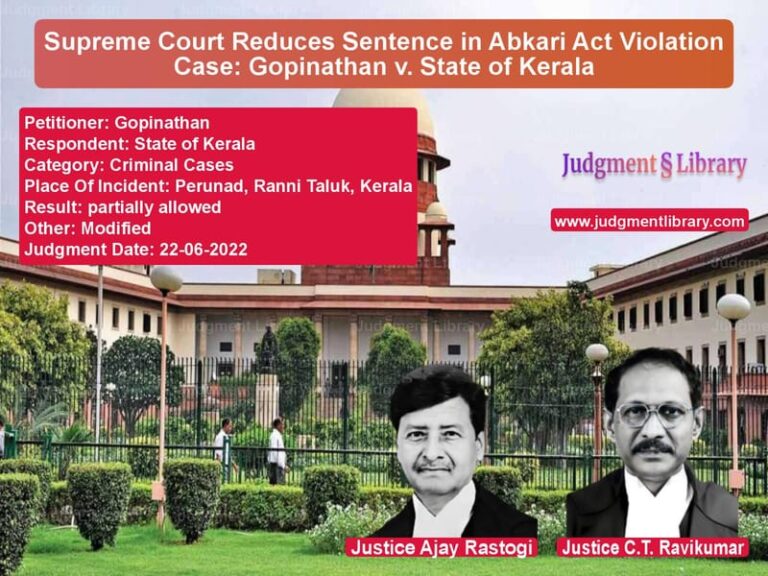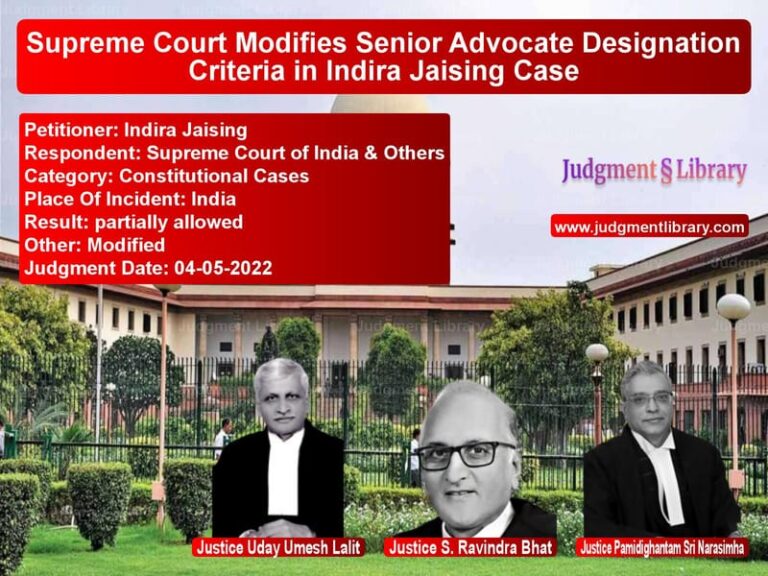Motor Accident Compensation: Supreme Court Rules ‘Pay and Recover’ Against Insurance Company
The Supreme Court of India, in the case of Shamanna & Another v. The Divisional Manager, The Oriental Insurance Co. Ltd. & Others, reaffirmed the principle of ‘pay and recover’ in motor accident compensation cases. The judgment, delivered on August 8, 2018, by a bench comprising Justice Ranjan Gogoi and Justice R. Banumathi, ruled that the insurance company must first pay the compensation to the claimants and then recover the amount from the vehicle owner.
Background of the Case
The case arose from a fatal motor accident that occurred on April 14, 2008, involving a passenger named Shankareppa Pattar. He was traveling in a jeep when the vehicle’s door suddenly opened, causing him to be thrown out. He sustained serious injuries and later died in the hospital.
His parents filed a compensation claim before the Motor Accident Claims Tribunal (MACT), which awarded Rs. 3,55,500 with interest at 6% per annum. Since the jeep driver did not have a valid license, the Tribunal directed the insurance company to pay the amount first and recover it from the vehicle owner. The insurance company appealed before the Karnataka High Court, which ruled that the insurer was not liable and that the owner should directly compensate the claimants. The claimants then appealed to the Supreme Court.
Petitioners’ (Claimants’) Arguments
The appellants (parents of the deceased) contended:
- The Karnataka High Court erred in setting aside the ‘pay and recover’ order issued by the Tribunal.
- The Supreme Court, in similar cases, had allowed the insurance company to pay compensation first and recover it from the vehicle owner.
- The insurance company should be liable for third-party claims under the Motor Vehicles Act, 1988.
- The compensation awarded should be enhanced considering the young age and earning capacity of the deceased.
Respondents’ (Insurance Company’s) Arguments
The insurance company, opposing the appeal, argued:
- Since the driver had no valid license, there was a breach of policy, making the owner solely liable.
- The Karnataka High Court correctly applied the legal principle by absolving the insurance company of any liability.
- The ‘pay and recover’ doctrine is an extraordinary relief granted under Article 142 of the Constitution and should not be a standard remedy.
Supreme Court’s Observations
The Supreme Court analyzed the legal precedents and made the following key observations:
- The doctrine of ‘pay and recover’ was well-established in National Insurance Co. Ltd. v. Swaran Singh (2004), wherein the insurer was held liable to compensate victims even when the driver lacked a valid license.
- While the insurer could later recover the amount from the vehicle owner, the immediate compensation to victims was paramount.
- The High Court misinterpreted previous Supreme Court rulings by ruling against the claimants.
- Compensation in motor accident cases must prioritize the rights of victims rather than legal disputes between insurers and vehicle owners.
Final Judgment
The Supreme Court ruled:
- The insurance company must pay the compensation to the claimants.
- The insurer has the right to recover the amount from the vehicle owner.
- The compensation was enhanced from Rs. 3,55,500 to Rs. 4,94,700.
- The Karnataka High Court’s decision exonerating the insurance company was set aside.
- The insurance company must pay the enhanced compensation with accrued interest.
Impact of the Judgment
This ruling reinforced key legal principles:
- Ensuring Victim Compensation: The judgment prioritizes the rights of accident victims over procedural insurance disputes.
- Liability of Insurers: Even in cases of policy breaches, insurers must first compensate victims before seeking recovery.
- Uniformity in ‘Pay and Recover’ Doctrine: The decision aligns with previous Supreme Court rulings, ensuring clarity in motor accident claims.
Conclusion
The Supreme Court’s ruling in Shamanna v. Oriental Insurance Co. Ltd. is a landmark decision that upholds the rights of accident victims. By directing insurers to pay compensation first and recover later, the judgment ensures timely relief for claimants while reinforcing the accountability of vehicle owners. This case sets a strong precedent for future motor accident compensation claims under Indian law.
Petitioner Name: Shamanna & Another.Respondent Name: The Divisional Manager, The Oriental Insurance Co. Ltd. & Others.Judgment By: Justice Ranjan Gogoi, Justice R. Banumathi.Place Of Incident: Karnataka.Judgment Date: 08-08-2018.
Don’t miss out on the full details! Download the complete judgment in PDF format below and gain valuable insights instantly!
Download Judgment: Shamanna & Another vs The Divisional Manag Supreme Court of India Judgment Dated 08-08-2018.pdf
Direct Downlaod Judgment: Direct downlaod this Judgment
See all petitions in Compensation Disputes
See all petitions in Motor Vehicle Act
See all petitions in Negligence Claims
See all petitions in Judgment by Ranjan Gogoi
See all petitions in Judgment by R. Banumathi
See all petitions in allowed
See all petitions in Modified
See all petitions in supreme court of India judgments August 2018
See all petitions in 2018 judgments
See all posts in Accident Cases Category
See all allowed petitions in Accident Cases Category
See all Dismissed petitions in Accident Cases Category
See all partially allowed petitions in Accident Cases Category







